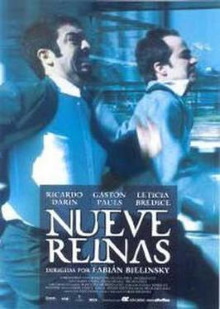This is an Argentine film that is apparently very well known but I haven’t heard of it before I read it being talked about by Tyler Cowen in the context of films that best represent the country. At first I was skeptical as it seemed like a slick movie about conmen which could have taken place anywhere. I eventually realized that it is meant to represent the entirety of Argentine society from the elites at the top to the street-level hustlers who are the main characters here and that is why it is a such brilliant film.
When Juan tries pulling a simple change scam in the same store twice, he is bailed out of trouble by Marcos who pretends to be police officer apprehending him. Marcos is an older and more experienced con man and asks Juan to be his new partner after Juan explains that he needs money to help his father. After they spend some time showing each other their cons and tricks, Marcos gets a call from his sister Valeria who works at a posh hotel. One of Marcos’ old associates, Sandler, has fainted in the hotel while trying to pull off a con and has asked her to call him. Sandler is a forger and he has forged a rare set of stamps known as the Nine Queens. His mark is Gandolfo, a rich Spaniard staying in the hotel who collects such stamps and is about to be deported for some corrupt deals. This means that Gandolfo has little time to verify the authenticity of the stamps. Marcos and Juan takes over the scam in exchange for the promise of a cut to Sandler and sets out to lure Gandolfo’s interest.
I’m sure everyone has watched plenty of films about conmen and their tricks but I think you’d still be surprised by how many cons they manage to pack in here. There’s the huge deal that they’re trying to get done with the stamps of course with its innumerable twists and turns but there also all kinds of small cons too. Those are always entertaining and maybe educational to us to watch out for too. Sometimes they are so petty that even Juan asks Marcos why he is such a miser when he scams a copy of a newspaper from a newsagents by pretending his daily delivery never arrived. As Marcos teaches Juan this is just the tip of the iceberg as those with the trained eyes to see can notice that the streets are filled with scammers, snatch thieves, lookouts and all manner of other petty criminals looking for an opportunity. It’s almost as if scamming is the Argentine national pastime! Even Juan confesses that it was his father who taught him the trade and though he has tried to look for some other productive work to do, nothing else seems worthwhile.
That of course is the point the filmmakers are making and why this film is seen as being emblematic of Argentina. As I’ve been reading recently, the country was once one of the richest countries in the world but now has a per capita GDP that is actually lower than Malaysia and is probably the poster child for its habit of defaulting on sovereign debt. We can therefore see in this film the frustration their people feel in how the rot of always being hustling for money starts at the top and permeates across the entirety of society. At one point we see Juan retrieve the money he has saved to help his father bribe a judge so that he can leave prison in the form of cash that he keeps in a box and I wondered why he does that instead of keeping it in a bank account like a sane person. Well, the film’s ending answers that rather conclusively. It really is quite brilliant how the film combines the slick thrill of an elaborate scam with an incisive sociopolitical statement. The twist at the end doesn’t entirely make sense given that even the greatest mastermind couldn’t have foreseen everything, but it’s an acceptable enough simplification for the sake of entertainment.
The tragedy here is that this was director Fabián Bielinsky first feature film but he died in 2006 before his second film was even aired. Given the strength of his work, this was a real loss to the world of cinema. Argentine cinema is very strong however and this isn’t even the first Argentinean film I’ve featured here. It is doubly sad that the country is so beset by endless financial crises that this is considered the most representative of the current state of their society.

One thought on “Nine Queens (2000)”